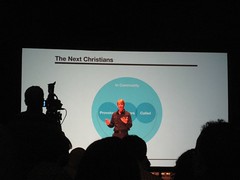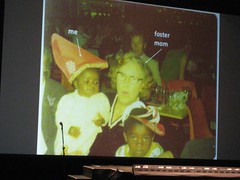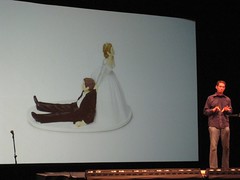Q Conference
Day 2
What better way to open the first morning presentation than with …
Recovering the Ancient Practices – Phyllis Tickle
“In the busyness of life today, many Christians lose sight of the disciplines, or practices, that keep them grounded.”
As always, she is awesome.
Some favorite lines – “Jesus tells us to fast – why? Because it makes us feel bad – lol.
(Fasting reminds us of our mortality. Fasting draws us in to, our energy wanes and we are confronted by the truth. It is an opportunity for us to meet the Kingdom.)
It’s only when I am confronted my citizenship that I can understand the Kingdom.
There is a rhythm of life and fixed hour prayer is a way of hinging our day on the worship of God. She mentioned an iPhone app. I think it was this one.
Of all the disciplines, she believed that fixed hour prayer is the most important.
She quoted a rabbi that said, it’s the prayers you say, not the ones you don’t that God really cares about. (That actually does help in not turning into a guilt-ridden ritual).
Of the disciplines, sabbath keeping and fixed hour prayer have been difficult for me. I found this convicting and helpful.
I like what she said about “Pilgrimages” – you take all of you and your expenses and go. One of the things contemporary christianity lacks is transcendence –
we can do so with music, literature, but true transcendence a pilgrimage.
Observing the Sabbath – Matthew Sleeth
Q must have got some feedback that asked for more spiritual formation.
Are today’s believers meant to keep the Sabbath?
I liked Matthew’s idea of 24-6 (as opposed to 24-7).
Sabbath not saved by man. – We are not to save the Sabbath – The Sabbath is to save us.
5000 Years of debate of what is work – Rest “figure out what’s work for you and don’t do it.” (Matthew’s wife)
if you keep sabbath for life – you added 11 years with the Lord.
We spent the last minute and change in silence (a tithe of the presentation to sabbath. Cool idea).
Overcoming the Faith and Science Divide – Alister McGrath
I love the faith and science discussion.
In addition to encouraging everyone to engage the sciences, he also encouraged to familiarize ourselves with the views and arguments that argued against faith (like Dawkins’ God Delusion and other new atheists). Lucky for me, I like these books (they strengthen your faith).
One of the reasons why they new atheists are angry. Because they believed that religious belief would have died out within the last 40 hours. “When I read Dawkins, I cannot help but feel nostalgic, that’s the way I used to be as well.” – haha
Encourage – we need scientists to up their game. – They need support.
Think of how we can support scientists from the church.
Don’t Eat the Food – Sean Womack
A very powerful and emotional presentation. It’s nice to see that cutting edge thought is not just confined to stats and ideas.
Forgiveness is cutting edge.
Sean revealed that he had been let go by Wal Mart for having an affair with his boss.
After separated for 3 months from his wife and 3 children, she forgave him. She told him, “I am not just praying for you, I’m battling for you.”
Don’t eat the food (of the world) – Jesus said eat my flesh.
The last 3 years have been difficult
H addressed his wife, – thanks for battling for me, thanks for banging on the gates of hell and demanding your husband back. Every morning I wake up, I wake up next to grace.
I guess I walked away thinking, may God spare us from such an experience but it was beautiful to see the power of love and forgiveness.
Resetting a Creative Economy – Richard Florida
One of my favorite presentations of the event.
“Every human being is creative.”
Florida doesn’t believe we are in a recession but instead in need of a reset – a raw emotional reset.
He looked at other time periods including just before the Industrial Revolution.
He would argue that our creative energy is that makes us human and binds us together.
We have created a new kind of economy that harnesses the human mind – that’s the easy part.
We are moving into a new of post-materialism.
We use to ask what you do for a living, now we ask where do you live?
Being in a place that you love. – in community – Whose Your City? (example used was Jack White from Detroit, now living in Nashville but I didn’t want to stand up and correct Florida in front of everyone. I understood his point. But I had to chuckle now because of the irony of White living in Nashville. Or is it irony?
It’s the place we live that will create meaning
There was a lot I liked about the end, because I see a strong connection with where we live and “Let your will be done on earth as it is in heaven”.
Responding to Our Fatherhood Crisis – Roland Warren
As a new father, as a youth pastor, and as one who sees the state of fatherhood in crisis, I was really looking forward to this presentation.
“The concept of the heavenly father is a Christian idea.But this is an anathema for someone who didn’t grow up with a father (or had a bad one).”
“You fix the fathers you fix the church,you fix the fathers you fix the community ”
I really enjoyed the presentation but was hoping for a little more. I am sure Roland had plenty more to say but again, it’s tough because of the time restraint.
I should google him and see what else he has.
——————-
There was a panel discussion on adoption and orphans
John Sowers – Mentoring project
Esther Fleece – Focus on the family
Marc Andrews – Bethany Christian Services
Jason L –
127,000 legal orphans
300,000 churches
“Wait No More” program
icareaboutorphans.org
500,000 kids in the foster care system
countless age out – turn 18
As adoptive parents, this is obviously something that is important to us. As I was listening, it dawned on me that although Susan and I had been asked numerous times about adoption, we do not know anyone who has adopted since we have two years ago. This caused me to think that perhaps I ought to do my part in creating more awareness to the need.
———————
Discover the Rescued with Soledad O’Brien | CNN and Jonathan Olinger | Discover The Journey
The 7.0 earthquake in Haiti devastated millions of lives. Compassion-fatigued American’s have become over saturated. The natural questions ensue. Can Haiti change? Is there hope for Haiti’s most vulnerable children? Through the power of a documentary platform, the lives of two Haitian orphans are elevated and their stories told. CNN Correspondent Soledad O’Brien and Discover The Journey’s Jonathan Olinger open the world’s eyes to the complexities of caring for children in the midst of one of the greatest disasters the world has ever seen.
In short, Jonathan was shooting a documentary and then the earthquake happened. If I have the story right, Soledad became involved just after flying down to cover the aftermath of the quake and then connected with Jonathan’s story. Gabe interviewed them both and this was the most beautiful and my favorite part of the interview:
Gabe – How do you handle all the suffering?
Soledad – I cry a lot but I channel it through my vehicle.
Once you get numb to human suffering, that’s the beginning of the end …
The documentary this past Saturday night but I was unable to watch it. I am trying to obtain a copy or if it’s online somewhere. Seems worth watching.
——————–
I’ll post separately on Conversations on Being a Heretic. It was Scot McKnight interviewing Brian McLaren. It was great, too short, and grateful that both are brothers of mine in the Lord.
 Who Attends Q?
Who Attends Q? The Next Christians – Gabe Lyons
The Next Christians – Gabe Lyons “We need a new standard of teachers that are better.”
“We need a new standard of teachers that are better.” She then put a picture of her, her sister and her foster mother and asked, “Would you have found me in the rubble?” Because she was lost and buried in it and needed a great deal of help. It was a brilliant turn in the presentation – instead of presenting as the hero, she presented as the rescued, who in turn committed to rescue others. I was moved, she was brilliant.
She then put a picture of her, her sister and her foster mother and asked, “Would you have found me in the rubble?” Because she was lost and buried in it and needed a great deal of help. It was a brilliant turn in the presentation – instead of presenting as the hero, she presented as the rescued, who in turn committed to rescue others. I was moved, she was brilliant. When all words mean the same thing, no words mean anything?
When all words mean the same thing, no words mean anything? 1. men want sex more than women
1. men want sex more than women That evening, there was a panel discussion on Scripture with Alister McGrath, Brian McLaren, Father Dempsey Rosales-Acosta and Tim Keller. It is heavy in context so to debrief in this space would be inadequate but I will say it was an excellent discussion. There were parts that I was not able to connect with and parts that I cheered (sometimes said by the same person). I look forward in listening to this conversation again.
That evening, there was a panel discussion on Scripture with Alister McGrath, Brian McLaren, Father Dempsey Rosales-Acosta and Tim Keller. It is heavy in context so to debrief in this space would be inadequate but I will say it was an excellent discussion. There were parts that I was not able to connect with and parts that I cheered (sometimes said by the same person). I look forward in listening to this conversation again. It was back in college (Liberty University) that I learned about the “Culture War”. I remember having to be convinced that there was one. Prior to that, I do not remember having many enemies. In the 90’s, I think I disliked two groups of people, abortion doctors and Red Sox fans ;-). Around that time, I only had a few problems, bad luck with girls, Greek (the language, not any frat reference. Come on, the context is Liberty University! ;-), and rock n’roll sucked. As I recall, in 1997, there were two songs on the radio, Matchbox’s 20 “Push” and Sugar Ray’s “Fly”. Oh wait, there was Chumbawaba and boy bands were about to take over the world. In response, I started listening to John Coltrane, Miles Davis and other classic jazz musicians.
It was back in college (Liberty University) that I learned about the “Culture War”. I remember having to be convinced that there was one. Prior to that, I do not remember having many enemies. In the 90’s, I think I disliked two groups of people, abortion doctors and Red Sox fans ;-). Around that time, I only had a few problems, bad luck with girls, Greek (the language, not any frat reference. Come on, the context is Liberty University! ;-), and rock n’roll sucked. As I recall, in 1997, there were two songs on the radio, Matchbox’s 20 “Push” and Sugar Ray’s “Fly”. Oh wait, there was Chumbawaba and boy bands were about to take over the world. In response, I started listening to John Coltrane, Miles Davis and other classic jazz musicians.




Recent Comments